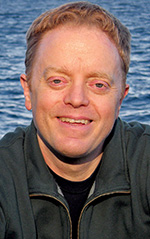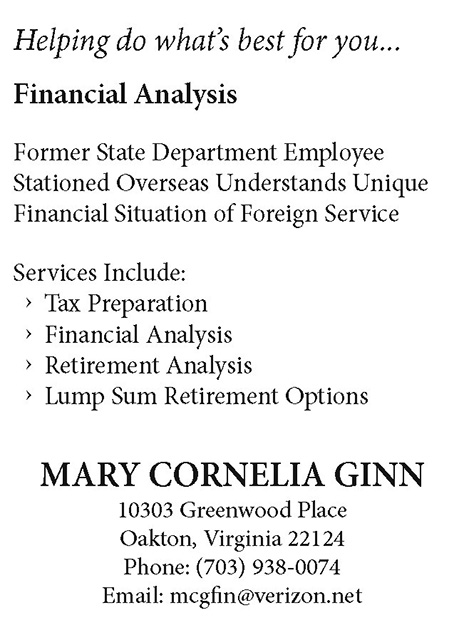Transferring in a Time of Chaos
Challenging in the best of times, FS transfers have become crucibles of resilience and determination during the pandemic.
BY CAMERON WOODWORTH
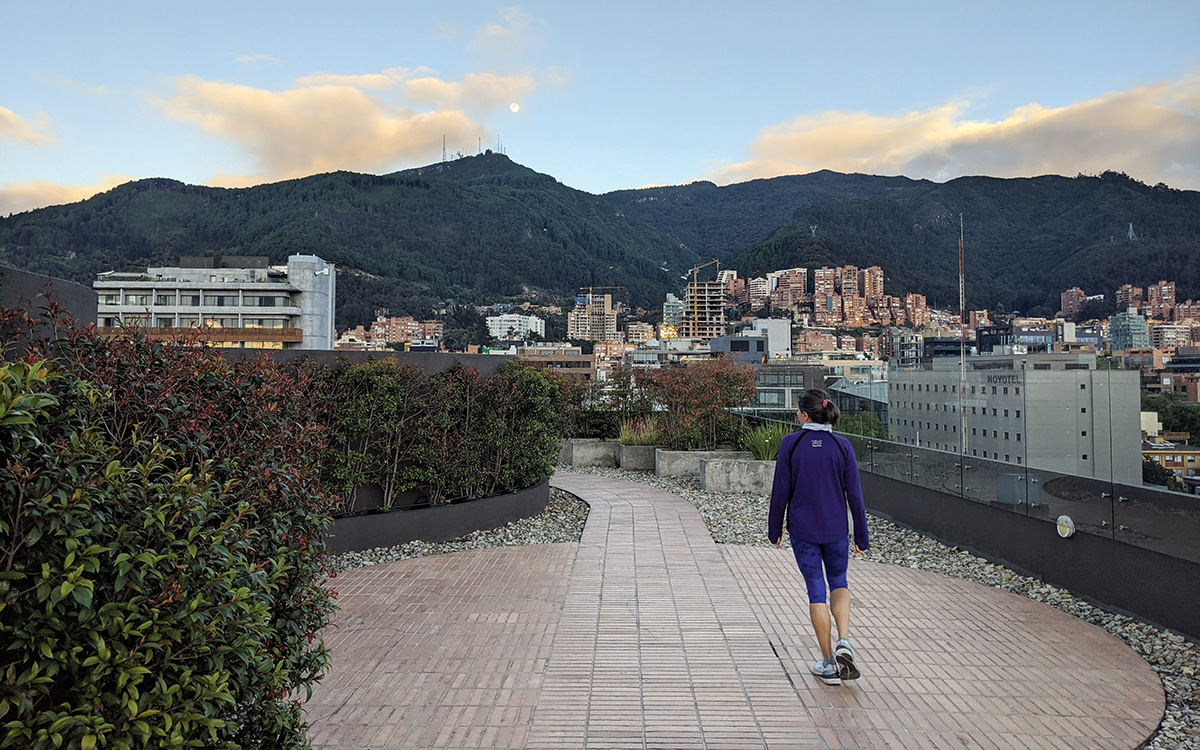
A rooftop track was a handy escape from lockdown during the stay at a temporary hotel after landing in a city under quarantine.
Cameron Woodworth
As any Foreign Service family can tell you, moving to a new post is not easy. Even in the best of times, it can be tough to adjust to a new culture, figure out a new embassy community and make new friends. During a pandemic, the challenges rise exponentially.
In January 2020, my wife, Monica Smith, a Senior Foreign Service officer who has served for 20 years as a USAID attorney, delayed retirement to accept a oneyear assignment to Bogotá to fill a staffing gap. It had long been a dream of ours to serve in South America, and we expected to move sometime that spring.
Then the pandemic hit, throwing our plans into disarray. On March 17, 2020, Colombia closed its borders to international flights. Like thousands of other Foreign Service colleagues, we would experience several months of bureaucratic complications and general confusion before we finally arrived at post, where settling in presented another set of difficulties.
Our story and the experiences of others recounted here, along with some lessons learned along the way, will hopefully help those members of the Foreign Service facing transfers in the coming months and beyond.
Getting There
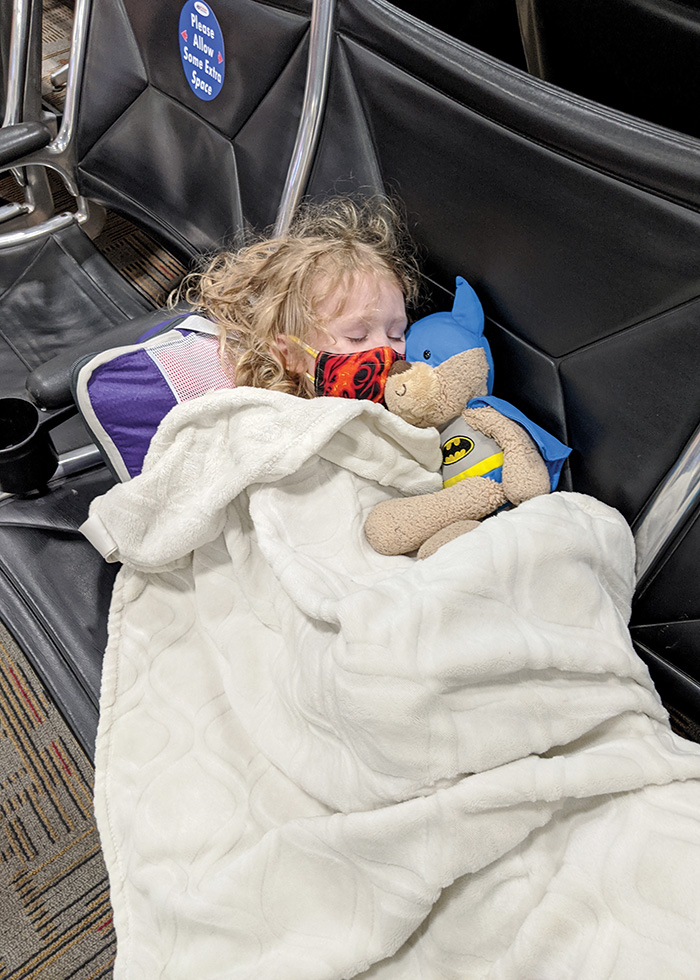
The youngest member of an FS family, duly masked, naps in the airport during transit.
Anne Schofield
For months, it was unclear if we would ever make it to Bogotá. In March 2020, the State Department began authorizing voluntary, no-fault curtailment to employees in any country considered to be at high risk of exposure to COVID-19. By the beginning of April, State had evacuated more than 6,000 American diplomats and their families from overseas posts. That month, the department announced a hold on summer transfers to overseas posts at least until the end of May 2020.
Diplomacy Strong, the department’s three-phase road map for returning to normalcy released in the spring of 2020, outlined the difficulties ahead: “The global pandemic presents unprecedented challenges that will require extraordinary patience and perseverance in the face of uncertainty. Missions and employees will need to remain flexible, as the Department adjusts to gradual normalization of travel.”
Given early concerns about the dangers of flying during a pandemic, we were not even sure we wanted to travel. Wouldn’t it be safer to stay at home in Arlington, Virginia, than transit through three airports and sit on two flights to Colombia? Moreover, Bogotá issued a strict lockdown order in late March, which ended up lasting several months. Would we be able to get as much out of our assignment as we did at other posts? And would it be more difficult for Monica to feel part of the mission working from home?
Ultimately, we decided to go. Even if the pandemic did not abate, and we were required to be on lockdown for our entire year in Colombia, we felt we would still learn much about the country just by living there, and Monica would have a great opportunity to contribute to U.S. foreign policy goals in South America.
In April 2020, USAID Bogotá informed us that Monica had been placed on a list of mission-critical embassy workers who would be permitted to fly to Bogotá on a humanitarian flight, even while Colombia’s borders were still closed. Yet much uncertainty about the timing, and many bureaucratic obstacles, remained. Embassy personnel, most forced by the pandemic to work from home, scrambled to help incoming families deal with new Colombian government procedures for obtaining visas virtually and receive permission to enter the country. We greatly appreciated the professionalism of the Foreign Service officers and local staff who helped us figure out this puzzle.
Landing in Lockdown
While we waited for a departure date, U.S. Embassy Bogotá invited us to participate in virtual town hall meetings designed to keep the embassy community informed about the emerging COVID-19 situation at post. We found these meetings, which have continued every several weeks since we arrived in Colombia, to be enormously helpful. Through them, U.S. Ambassador Philip Goldberg and his team have helped both the existing embassy community and incoming families deal with issues ranging from current COVID-19 restrictions in Colombia and permanent change of station (PCS) travel challenges to when Foreign Service families might get the vaccine.
In late July, we finally arrived in Bogotá. Walking through the mostly empty El Dorado International Airport, where workers in full-body hazmat suits sprayed us and other passengers with disinfectant, was decidedly eerie. Our apartment wasn’t ready, because the pandemic had delayed the departure of the family living in it before us. We were required to quarantine for two weeks in a hotel apartment. It was a sharp contrast to previous postings, when we could get out and see the country—and meet people—immediately.
It was a sharp contrast to previous postings, when we could get out and see the country—and meet people—immediately.
The embassy couldn’t work on our assigned apartment because of neighborhood lockdowns and evolving COVID-19 protocols. We stayed in the small hotel apartment for nearly three months, trying to do our Zoom meetings without getting in each other’s way. Monica struggled to complete the embassy check-in virtually. One problem was that embassy officials expected the check-in process to be completed on State Department computer systems, an obstacle for people from other agencies without access to those systems.
More than seven months after we arrived, Monica, like most U.S. Embassy Bogotá employees, is still working from home as the pandemic continues to rage here. While not having to commute into the office has its advantages, it is harder to build camaraderie, friendships and teams while working virtually.
As this edition of the Journal goes to press, it seems that PCSing will continue to be complicated for a while longer. As of Feb. 10, 38 percent of posts worldwide were still in Diplomacy Strong’s Phase I, which limits onsite embassy workers to 40 percent of the full staff. Only 8 percent were in Phase III, which allows 80 percent or more of workers to be onsite. The State Department had also announced that international trips should be avoided unless they were mission critical, given current high rates of transmission in the United States.
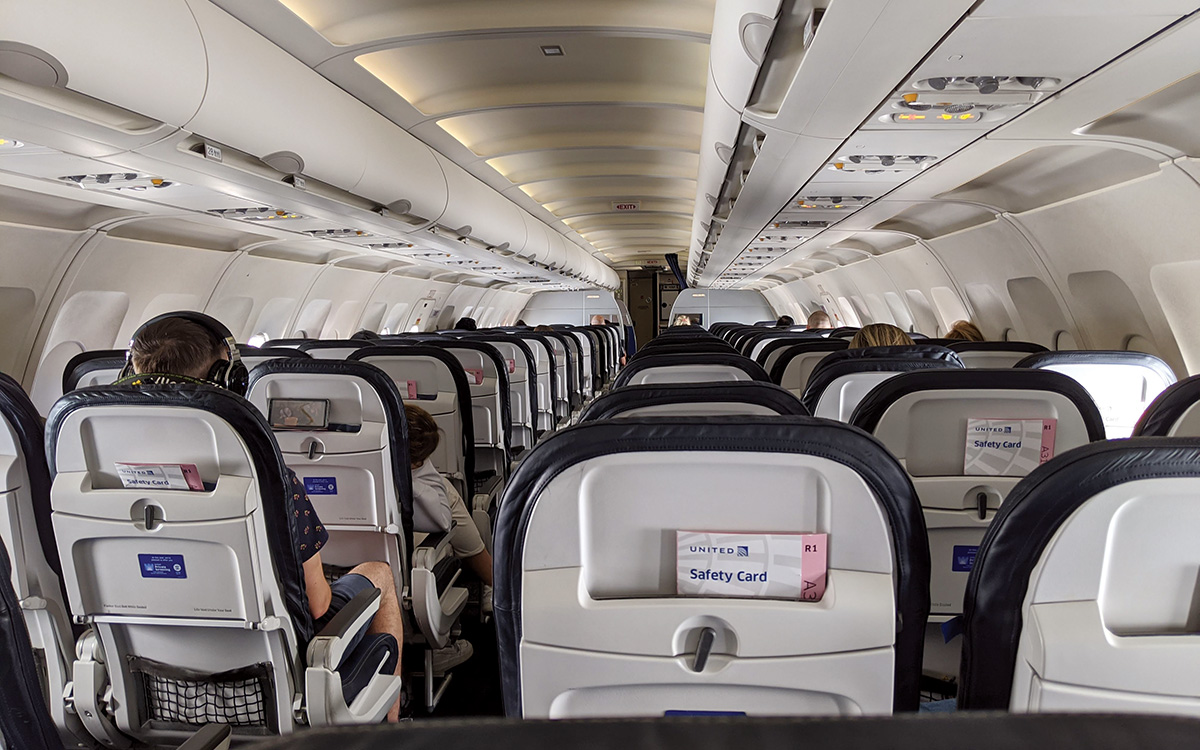
The first leg of the trip to post was on a mostly empty plane.
Cameron Woodworth
It is always good to be proactive with post, even more so during the confusion of a pandemic.
Be Prepared for Anything
Our experience has by no means been unique, as my email exchanges with other members of the Foreign Service make clear. Take U.S. Ambassador to Uganda Natalie Brown, for instance, who had a bumpy ride PCSing from the United States to Uganda last fall. She found the changing COVID-19 testing requirements and practices of airlines and transit countries frustrating. Uganda required a negative test for entry, but Amsterdam, through which she transited, had additional requirements, telling passengers to complete forms they had not been made aware of prior to departure.
“We were late leaving Amsterdam for Uganda,” Amb. Brown says, “because Rwanda, the first stop on the journey, wanted all travelers to register online for contact tracing. At the airport, not everyone had a smartphone to do this, so passengers helped out each other, and KLM delayed departure to accommodate all travelers. There is nothing the department could have done to prepare travelers for this, but the lesson for me was to be prepared for everything.”
Most difficult for Brown, however, was that extensive efforts to take her dogs with her proved futile. “I’m fortunate that friends and family are willing to take care of my pets,” she said shortly after arriving at post. “I know of many others without such a back-up plan.”
Get in Touch with Folks Who’ve “Been There”
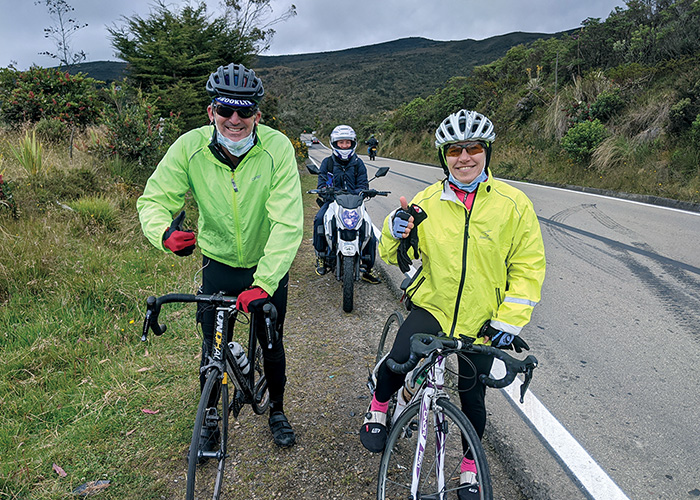
While working remotely in Bogotá, a city under rolling lockdowns, USAID legal counselor Monica Smith (at right) takes advantage of a biking outing to get to know her colleague USAID Mission Director Larry Sacks.
Cameron Woodworth
Anne and Aaron Schofield and their six children were scheduled to fly out of the United States to Amman, Jordan, on July 15. But there were many wrinkles along the way: securing medical clearances, obtaining eight diplomatic passports despite the passport office’s limited operations early in the pandemic, and setting up the kids’ schooling, for starters.
Two months later, just before their departure date, the family’s school of choice unexpectedly said it was denying all the kids’ applications. Five days before boarding one of the last repatriate flights to Jordan, “we applied to another school without any time or ability to consider whether it would be a good fit for our kids,” Anne Schofield says. (The kids were accepted.) The family finally landed in Amman on Sept. 10, “just as cases locally started to skyrocket.”
Post didn’t have any available houses large enough for a family of eight, so the Schofields boarded in a hotel for five weeks. The family was given a choice of quarantining for three weeks without COVID-19 testing or quarantining for two weeks with two tests two weeks apart. “If any of the family tested positive, we would be evicted from the hotel with exactly nowhere to stay,” Schofield says. “We voted for three weeks of quarantine.” Fortunately, she adds, good folks at post arranged loaner toys for the kids, groceries and adapter plugs for the family’s many laptops.
Schofield recommends that people with upcoming PCS plans join Facebook groups such as Trailing Houses, which, she says, “has kind people with many years of experience PCSing.” Many posts have private Facebook groups (usually organized through the Community Liaison Office) that can prove invaluable. You might also find good expat Facebook groups in the city to which you are moving. Schofield also recommends taking care of health care appointments in the United States before PCSing.
Be Flexible and Proactive
“2020 has been a year like no other in so many ways,” says Jimmi Sommer, the management counselor at Consulate General Guayaquil in Ecuador.
Sommer, who “never imagined moving during a global pandemic,” did a direct transfer from the Netherlands to Ecuador and started work, from home, the day after she arrived. “I met all my direct reports and colleagues virtually,” she says. “There are a few folks who were on full-time telework that I still haven’t met in person.” One plus? For the first time, internet was already set up when she arrived at her new post. “Honestly, from the logistics side, it couldn't have gone smoother,” she says.
“As always, be flexible,” recommends Sommer, who found she had to juggle and change flight dates to get a direct route to post amid the confusion and upset in the airline industry and country border-closings.
Flexibility and proactivity are at the heart of some of the lessons we and others have learned.
Indeed, flexibility and proactivity are at the heart of some of the lessons we and others have learned:
Communicate with your new post early and often. It is always good to be proactive with post, but even more so during the turmoil of a pandemic. By now, more than a year into the health crisis, posts have hopefully worked out many of the kinks. We communicated constantly with Bogotá last spring and summer to try to line up our visas, humanitarian flight, shipments, housing and more, and that proved vital.
Make an effort to find friends. Working from home, and with significant city and embassy restrictions on our movement, we have found it harder to make new friends at post. Seek out permitted activities to meet people. Monica and I are avid cyclists, and we have made friends with USAID and embassy colleagues on weekend bike rides. An embassy book club has also proved helpful, though club meetings are often virtual, depending on current restrictions.
Sommer recommends finding ways to connect virtually during the pandemic. “Use it as a time to stay in touch with friends and family back home or at other posts,” she says.
Take advantage of opportunities to take a break. Ordinary relief valves such as local or regional travel, or organized sports or even restaurant outings, may not be available, so it is important to take advantage of opportunities that arise. Dealing with heaps of uncertainty is not easy. Be sure to have access to books, internet groups, online yoga or whatever works to relieve stress. And State’s WorkLife4You and USAID’s Staff Care programs provide invaluable counseling and referral services.
Despite all the pandemic uncertainty and myriad difficulties, more than halfway through our assignment, we are happy to have made the move to Bogotá and have already created many positive memories here. Traveling to a new post during a pandemic certainly is stressful and challenging, but it can still be highly rewarding.
Read More...
- “COVID-19 and the Summer Transfer Season,” by Tom Yazdgerdi, The Foreign Service Journal, July-August 2020
- “At State Department, Some Concerned That Political Appointees Are Jumping the Line to Get COVID-19 Vaccine,” by Colum Lynch and Robbie Graemer, Foreign Policy, December 31, 2020
- “Vaccine shortage prompts U.S. diplomats to request doses from foreign governments, including Russia,” by John Hudson, The Washington Post, February 17, 2021

